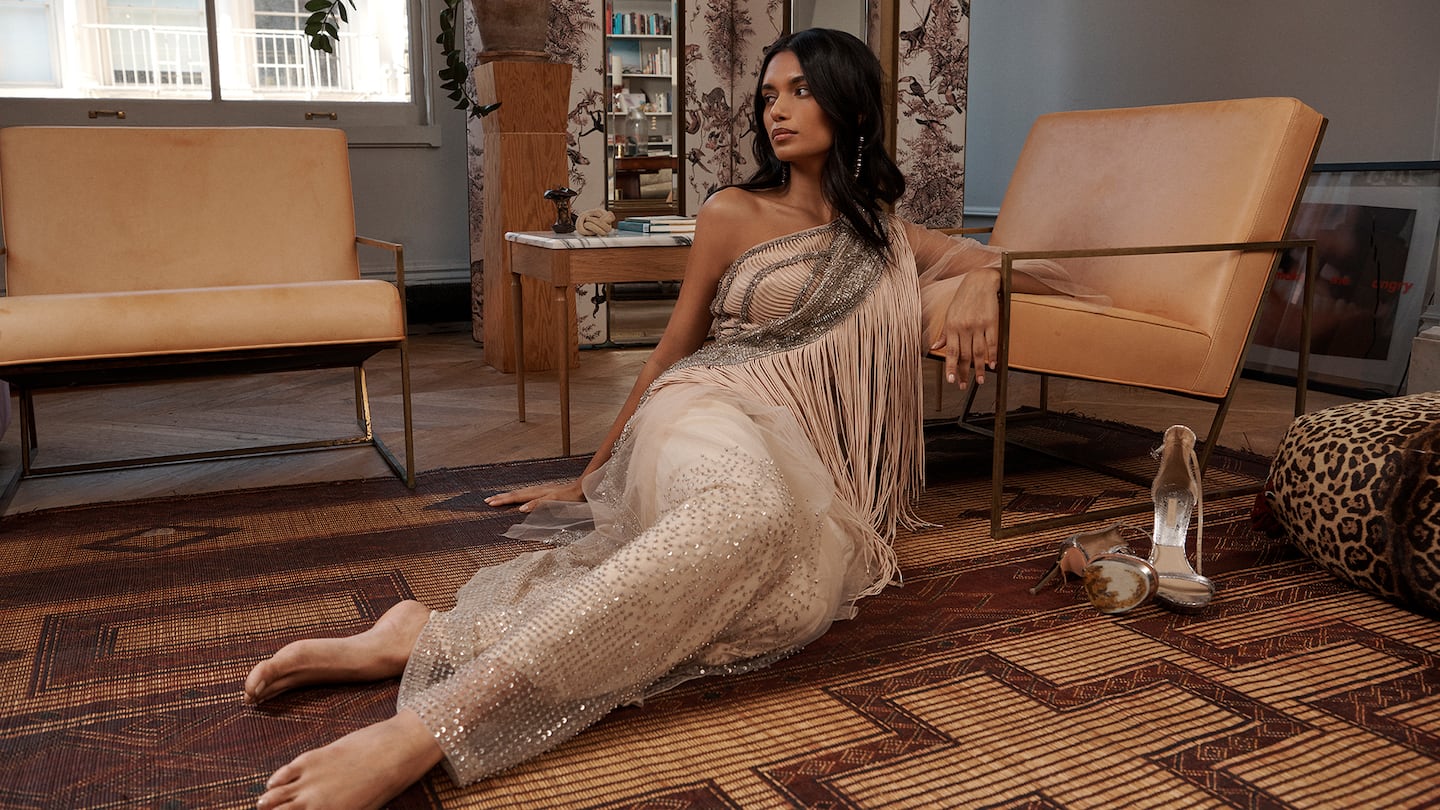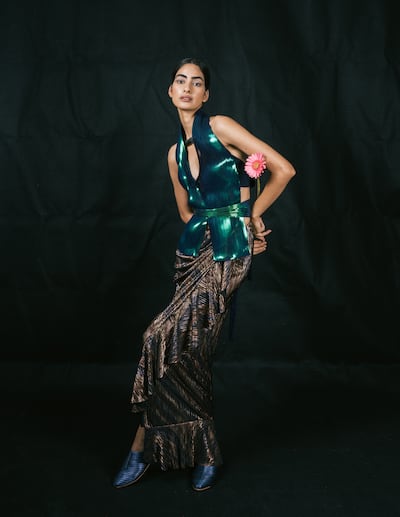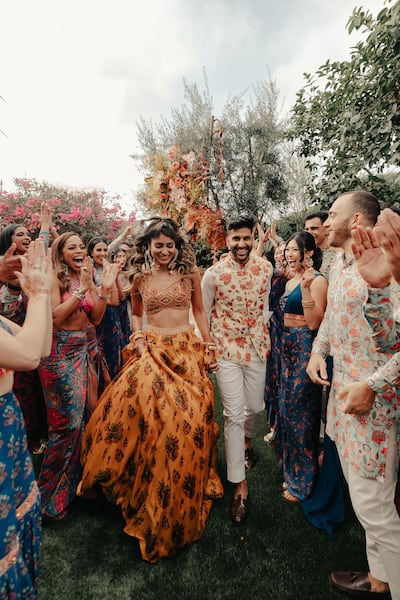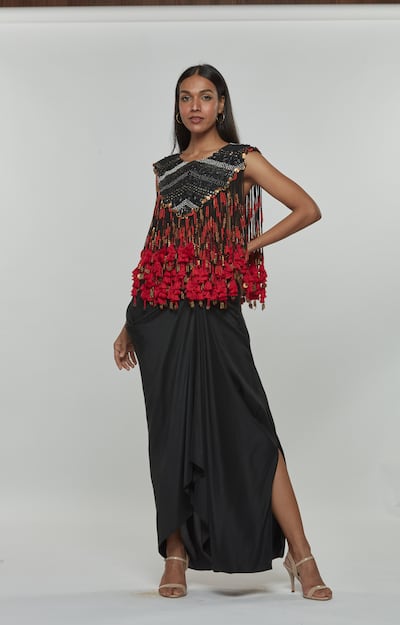The Business of Fashion
Agenda-setting intelligence, analysis and advice for the global fashion community.
Agenda-setting intelligence, analysis and advice for the global fashion community.

Last month, designers in Mumbai once again showcased the rich diversity of contemporary Indian fashion. One of the most influential buyers doing the rounds at the Lakme Fashion Week X FDCI event was Tina Tahiliani Parikh, chief executive at Ensemble, a pioneering multi-brand boutique founded by her brother and sister-in-law in the city in 1987.
Today, Tahiliani Parikh oversees a nationwide network of six stores stocking local brands like Anamika Khanna, Akaaro and Injiri. But domestic customers are not her only consideration when placing an order with a designer’s sales team. A rapidly growing e-commerce business means she also buys with another client in mind: “our NRI audience who...follow Indian designer trends,” she said.
NRIs (non-resident Indians) are the main category of the global diaspora that the Indian government tracks in its overseas Indians demographic, which also includes PIOs (persons of Indian origin). According to Ministry of External Affairs data, the global NRI population has exceeded 13.6 million, while PIOs now number around 18.6 million, bringing the global diaspora to more than 32 million.
“The Indian diaspora is a large, still very untapped market where the greatest challenge is reaching out to them in the most effective manner,” said Tahiliani Parikh, revealing that 8 to 10 percent of Ensemble’s overall sales now come through e-commerce, while a quarter of all e-commerce sales are to members of the global diaspora.
ADVERTISEMENT
A recent United Nations report estimates that there are now more people born in India living outside the country than any other nationality living overseas. It is a diverse group of people representing all income groups in numerous countries across North America, Europe, the Middle East, Africa, Asia and Australasia. While the luxury price tags that retailers charge for Indian designer wear are not universally affordable, they are for the more affluent members of the diaspora who make up a significant proportion of the population.
Many members of the diaspora feel a deep connection to India, expressed through dressing up for festive occasions such as Diwali or Eid and attending lavish weddings. Indian designer pieces are often worn for parties and black-tie events too. This extends beyond occasion-appropriate silhouettes like lehengas, kurtas or saris to the designers shaping new ways of interpreting Indian aesthetics, textiles and embellishments.
Legacy retailers like Ensemble — and other physical multi-brand stores in India that have expanded online such as Ogaan, Elahe and Aza Fashions — are not the only players trying to meet this demand. Specialist Indian e-commerce platforms like Pernia’s Pop-Up Shop have entered the race alongside physical stores with e-commerce units founded overseas by members of the global diaspora, such as Aashni & Co. in London and Kynah in Los Angeles.
One of the newest entrants is Oushq.com, a digital-native multi-brand e-tailer founded in December 2023 by Jessel Taank, the break-out star of reality TV show Real Housewives of New York City. Launched in the US, the company taps into an on-the-ground team of buzzy industry names in India, including celebrity stylists, to help it secure the right merchandise.

“By offering contemporary and fusion designs that blend traditional Indian elements with modern aesthetics, we can appeal to second-generation diaspora members seeking to reconnect with their cultural heritage in a fashion-forward way,” said Taank, who grew up in the UK to parents of Indian origin. Taank has over 20 years of industry experience, working for companies like Condé Nast, Stella McCartney, Victoria Beckham and Westfield.
Like some of the other entrepreneurs in this space, Taank is focused on improving the accessibility of designers for the global diaspora. She is also passionate about targeting non-diaspora consumers across international markets and changing perceptions about Indian design.
“One of the biggest driving factors for launching Oushq is to enhance global appreciation of Indian design and to increase its visibility on the international stage. We’re highlighting the fusion of traditional craftsmanship with modern design sensibilities, as well as showcasing the innovation and creativity of contemporary Indian designers, which ultimately challenge stereotypes and broaden perspectives,” she said.
Indian designer labels that offer high-octane evening wear and draw on Indian silhouettes and embellishments, such as Rocky Star, Papa Don’t Preach and Aisha Rao, are one focus of Taank’s curation.
ADVERTISEMENT
Until the early noughties, it was challenging to find high-end Indian ready-to-wear and occasion pieces in the US but that is now changing. Paris-born Srimoyi Bhattacharya, who ran her PR firm Peepul Advisory from New York in the early years, says that a combination of factors has “aligned to open the growth and potential of this market.”
Today, “a consumer in San Francisco has the same access to new launches as someone in Kolkata… compared to a decade ago when availability and awareness [among US-based consumers] would be dependent on a fleeting trunk show or a trip to the ‘homeland,’” she added.
According to Aashni & Co.’s founder Aashni Shah, diaspora consumers have unique needs that benefit from a specific curation of brands and product.
“One notable difference is the need for versatile pieces that cater to a multicultural lifestyle. Unlike in India, where traditional occasions dominate, diaspora customers often seek clothing suitable for various events, blending Western and Indian influences,” said Shah, noting that around 35 percent of the company’s overall sales for the global market are made through e-commerce.
For some of the online retailers focused on Indian designer brands, another client base consists of members of the wider South Asian diaspora — people with heritage in the region stretching from Bangladesh to Pakistan and Sri Lanka to Nepal. Designers who hail from or have heritage in those countries are also stocked by some of these specialty retailers.
For India-based designers looking to expand their international distribution network, specialist multi-brand e-tailers have the potential to fill a much-needed gap.

Some Indian brands are increasingly well distributed through mainstream international e-tailers — such as Lovebirds at Matches, Liberty and Harvey Nichols or Gaurav Gupta at Neiman Marcus and Bergdorf Goodman. However, others — including high-profile names like Sabyasachi, Vaishali S. and Rahul Mishra — are harder to find. None of the latter three have a presence on luxury e-commerce major Net-a-Porter, for example, though a few Indian labels, including Kardo, Harago, and Kartik Research, are available on Mr Porter.
This is where the likes of Aashni & Co and Ensemble come into their own. With a granular understanding of the tastes, preferences and requirements of affluent shoppers in India — such as the latest bridal colours popularised by celebrity weddings — specialists e-tailers are also able to interpret the latest micro-trends in traditional wear for members of the diaspora looking to buy online.
ADVERTISEMENT
It takes an expert eye to unpick the nuances of highly-embellished traditional Indian wear for formal occasions and to recognise which craft-infused designs can be adapted for daywear or black tie. Specialist platforms also tend to be more adept than mainstream e-tailers at catering to the festive seasonal sales spikes that are relevant to the diaspora. But curating product for distinctive local tastes is no easy task for a diverse diaspora across six continents.
“UK customers prefer more day-to-day pieces like co-ord sets and jewellery. US customers are more interested in embellished pieces for special occasions due to limited access to Indian stores and a desire for statement pieces. The US is also the furthest from India, making it harder for them to access India for the heavier pieces,” said Karnika Kisnadwala, founder of UK-based pure-play e-commerce platform Kaanjj, founded in 2021.
Platforms like Aashni & Co and Kynah also specialise in bespoke bridal services. Aisha Rawji, who founded Kynah in 2017, claims that their service eliminates the “pain points” diaspora brides can experience, including the stresses of finding their dream bridal ensemble on a short trip to India.
Kynah’s Los Angeles store, including its bridal service, now accounts for 33 percent of annual sales, whereas the remainder comes from its e-commerce business offering a mix of private label resort and festive wear and brands like House of Masaba and Payal Singhal. Rawji highlighted the growing importance of markets like Australia, which now accounts for 5 percent of sales.
With major international e-tailers like Farfetch and Matches now facing an existential crisis, the luxury e-commerce sector has been described as being broken. Some of challenges facing companies in Europe, including ballooning customer acquisition costs, mountains of unsold inventory, a ceaseless seasonal discount cycle and competition from luxury brands’ own dotcom sites, are challenges most e-commerce platforms focused on the Indian diaspora will also face.
On the other hand, the demise of global mainstream e-tailers could be an opportunity for stronger niche players to gain market share. Ultimately, the future health of each e-tailer will be depend on their business model, expertise, scale and degree of omni-channel integration among other factors.
Aashni & Co, which began with a store in London’s Notting Hill, expanded into e-commerce eight years ago and recently opened a store in Mumbai. By contrast, digital-first e-commerce player Pernia’s Pop-Up Shop has expanded into physical retail both domestically and internationally, including a store in London’s Mayfair.

Founded by Pernia Qureshi in India in 2012, Pernia’s Pop-Up Shop was acquired by Purple Style Labs in 2018. During a 2023 funding round that raised $8 million for Purple Style Labs, company founder Abhishek Agarwal told local media that he plans to expand the international store network of Pernia’s Pop-Up Shop from a single London outpost to New York, San Francisco, Los Angeles, Dubai and Singapore in the coming years.
“A physical store allows us to do higher-value transactions with our customers. For example, the AOV (average order value) of our UK online sales would be £400 ($498), but from the store, it is now almost 3 times that, around £1200,” Agarwal explained.
The business currently has 15 physical stores including domestic locations in Mumbai, Delhi, Bengaluru, Hyderabad, Kolkata, Ahmedabad and Surat. Agarwal told BoF that in the 2022-23 financial year, the business achieved gross sales from the global market, including the London store, of $23 million.
But some diaspora-focused e-commerce platforms serve Indian designers better than others. Gaurav Jai Gupta, whose label Akaaro is known for refined interpretations of handloom and signature molten metallic saris, is increasingly cautious, citing issues around consignment, discounting and the ability to communicate the ethos of his brand in clear and compelling terms.
“Unfortunately, there are [only a] very few players in the Indian e-commerce space who understand curation and have a well-defined brand list. It doesn’t serve any purpose to be just another name present on all the e-commerce platforms. We are rather selective,” he said, referring to partners Ensemble and Aashni & Co.
And what of the argument that specialist e-commerce platforms can never replace the experience of travelling to India to buy pieces in person? Divya Patel, who lives in London and works in fund management for HNWIs, suggests that both shopping options are desirable.
“There’s nothing like a trip to India and visiting my favourite stores in Jaipur and Bombay. Still, for an event or occasion that arises or for just something new, the e-commerce sites are great for discovering designers and pieces, and they mean I don’t have to wait until the next time I’m in India,” said Patel.
In an increasingly competitive and challenging global e-commerce market, platforms looking to earn the loyalty of affluent members in the Indian diaspora must cultivate a distinct point of view through a combination of storytelling, education, and curation using the right tone of voice.
Not least, given that many Indian brands are focusing more on their own e-commerce channels, multi-brand platforms will need to demonstrate the value they add not only to the end consumer but to the designers they wish to stock.
“A deep dive into the shopping journey is the only way to do justice to the sheer diversity of [fashion] design languages emerging from India,” said Bhattacharya. “E-commerce platforms must accompany designers [by] focusing on user experience — not just at the point of sale but with events, packaging [and] content.”
This week’s round-up of global markets fashion business news also features the China Duty Free Group, Uniqlo’s Japanese owner and a pan-African e-commerce platform in Côte d’Ivoire.
This week’s round-up of global markets fashion business news also features Brazil’s JHSF, the Abu Dhabi Investment Authority and the impact of Taiwan’s earthquake on textile supply chains.
This week’s round-up of global markets fashion business news also features Dubai’s Majid Al Futtaim, a Polish fashion giant‘s Russia controversy and the bombing of a Malaysian retailer over blasphemous socks.
As luxury marketing hits saturation point in Dubai during the Muslim holy month, global brands are ramping up their local engagement in other Gulf cities including Riyadh, Abu Dhabi and Kuwait City.